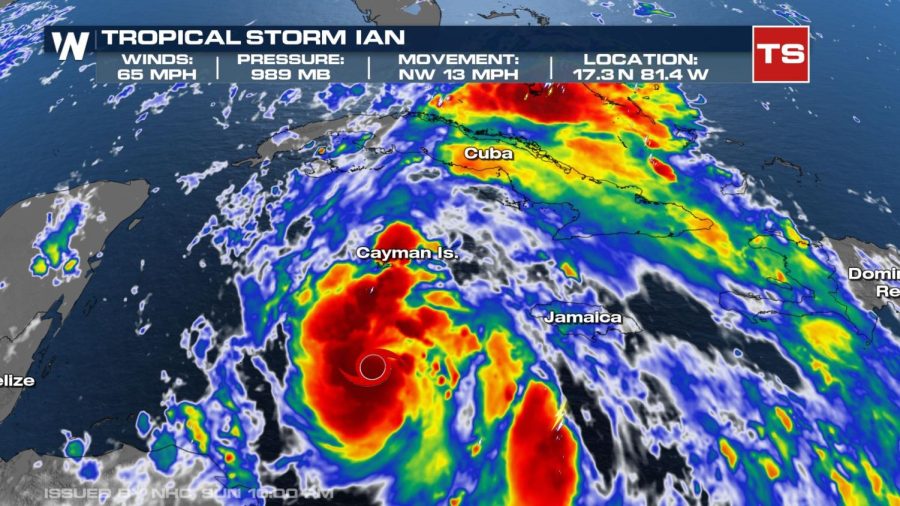Tropical Storm Ian Expected to Hit Florida This Week
How UWF students can prepare themselves for hurricane season
September 26, 2022
Florida is well-known around the United States for its alligators, beaches and especially its hurricane season.
Recently, the sunshine state narrowly avoided a landfall of Hurricane Fiona; Tropical Storm Ian, however, may not be so lenient.
As of the time of this writing, Tropical Storm Ian has passed over Jamaica and is moving west at around 15 miles per hour. Weather experts expect the Panhandle to be afflicted as early as Tuesday.
Should Tropical Storm Ian land in our city, it is best to prepare ahead of time just in case it brings similar damage as Hurricane Sally did nearly two years ago.
Whether it’s your first rodeo in hurricane season or you’ve experienced the infamous Floridian hurricane parties, here are a few ways UWF students can help themselves accommodate any potential power outages or closures:
Establish Risk
According to the National Oceanic and Atmospheric Administration (NOAA), the first important step one should take for hurricane preparedness is assessing your personal risk. For example, those closer to the beach are likely to be hit the hardest.
Thus, they should attempt to find housing or a hotel in an area that will likely keep them safe and warmer than their own home.
For UWF students living on campus, each dorm hall was built with the fear of hurricanes in mind and can withstand winds up to a Category 4 hurricane. In spite of this, the university still recommends that students be prepared in the event that they need to evacuate campus entirely.
For students living off campus, it is in your best interest to inquire with your leasing office about evacuation procedures in addition to what kind of winds the buildings can withstand.
Gather Non-Perishable Food
During times of crisis, it is imperative that you keep non-perishable food items and beverages on hand. The university will likely be closed in the event of severe weather, and the same will likely apply to nearby food and beverage businesses.
Pre-packaged water bottles are the safest bet for drinkable and cookable water use during an emergency. Hurry to gather these quickly, as they are the first product to go off the shelves when an imminent hurricane landing is announced.
The following list of food will be a tremendous help in the case of a prolonged power outage:
- Dry cereal
- Canned beans
- Canned pasta
- Canned vegetables
- Peanut Butter
- Bread
- Crackers
- Nuts
- Granola bars
- Apples
- Oranges
- Bananas
Fast food establishments and other restaurants may open up in the days following a hurricane; however, an established reopening time frame is never guaranteed.
Try to prepare these and similar no-prep food that will keep you eating while the damage is being repaired.
Create a Hurricane Survival Kit
As previously discussed, hurricane damage can affect a number of counties simultaneously and wreak carnage in its path.
Local services like the police, firefighters, and even electricians will all likely be unavailable in the initial days following a hurricane.
Creating a survival kit may help keep you and your loved ones safe in times of uncertainty. Here are a few ideas for what to include in your own kit:
- Water
- Food
- Flashlight
- First aid kit (Homemade or store bought)
- Batteries
- Whistle
- Manual can opener
- Map of local area
- Cell phone
- Dust mask
Every item on this list can play a vital role in keeping yourself and others safe. Although Floridians are accustomed to the parties and breaks that accompany a hurricane, it is crucial to prepare for the worst case outcome in the event of unexpected disaster.
For more information on hurricane preparedness, visit UWF’s severe weather guide or the NOAA’s fleshed out hurricane prep guide.
For live updates on the location of Tropical Storm Ian or other incoming hurricanes in the Atlantic Ocean, visit the following hurricane tracker.
For other live updates, visit projection trackers provided by major communications outlets like CNN.


